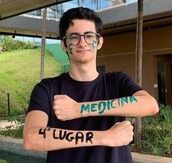FAG Medicina 2018/1
Text
We're living faster but are we living better?
Not Long Ago people believed that in the future we would work less, have more free time, and be more relaxed. But sadly this has not happened. Today we work harder, work longer hours, and are more stressed than ten years ago. We walk faster, talk faster, and sleep less than previous generations. And although we are obsessed with machines which save us time, we have less free time than our parents and grandparents had. But what is this doing to our health? An American journalist James Gleick in a new book, Faster: the Acceleration of just about everything, says that people who live in cities are suffering from 'hurry sickness'- we are always trying to do more things in less time. As a result, our lives are more stressful. He says that if we don't slow down, we won't live as long as our parents. For most people, faster doesn't mean better.
No time for the news
Newspaper articles today are shorter and the headlines are bigger. Most people don't have enough time to read the articles, they only read the headlines! On TV and the radio, newsreaders speak more quickly than ten years ago.
No time for stories
In the USA there is a book called One-Minute Bedtime Stories for children. These are shorter versions of traditional stories, specially written for 'busy parents' who want to save time!
No time to listen
Some answerphones now have 'quick playback' buttons so that we can re-play people's messages faster – we can't waste time listening to people speaking at normal speed!
No time to relax
Even when we relax we do everything more quickly. Ten years ago when people went to art galleries they spent ten seconds looking at each picture. Today they spend just three seconds!
No time for slow sports
In the USA the national sport, baseball, is not as popular as before because it is a slow game and matches take a long time. Nowadays many people prefer faster and more dynamic sports like basketball.
…but more time in our cars
The only thing that is slower than before is the way we drive. Our cars are faster but the traffic is worse so we drive more slowly. We spend more time sitting in our cars, feeling stressed because we are worried that we won't arrive on time. Experts predict that in ten years' time the average speed on the road in cities will be 17 km/h.
(OXFORD. NEW ENGLISH FILE, Pre-Intermediate, Student’s Book)
According to the text, mark true or false:
( ) Society are obsessed with machines which save us time and this is why we have less free time than our parents and grandparents had.
( ) In the USA, a book called One-Minute Bedtime Stories were made for 'busy parents', because they want to save time.
( ) Nowadays most people don't have enough time to read the articles. This is why the headlines are growing larger and the articles are ever smaller.
The CORRECT alternative respectively is:
False / False / True.
True / True / True.
False / True / True.
True/True/False.
Nenhuma das alternativas.
Tudo com nota TRI em tempo real



